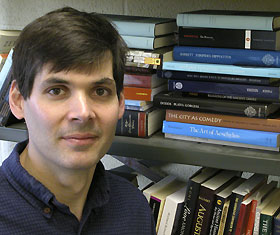|
This is an archived article.
For the latest news, go to the
Advance Homepage
For more archives, go to the Advance Archive/Search Page. | ||
|
Classicist Explores Notion Of More than two and a half millennia later, it might seem difficult to shed any new light on the topic of Greek tragedy. But that's the task Roger Travis, an associate professor of classics, has set himself.
Greek tragedy presents a particular challenge, he says, because only 31 examples remain out of the more than 500 that once existed. Those that do exist have been interpreted and reinterpreted by many scholars over the ages. Any new evidence that comes to light is fragmentary at best. "The ability to find something others have not yet done," says Travis, "is harder perhaps in classics than anywhere else." Travis hopes to make a contribution both to the literary criticism of tragedy and to the cultural history of 5th century Athens by treating tragedy as a cultural institution. He argues that the metaphorical world of drama and the real world of Athenian society were linked through education and its traditional reliance on poetry and myth. Last year, Travis pursued the topic as a fellow of Harvard University's Center for Hellenic Studies in Washington, D.C., a prestigious program that accepts just 12 fellows a year from all over the world. He says tragedy played a critical role in Athenian society, and poets were held in high honor. It was a communal genre. The spectators of a tragedy would know personally not only most of the other Athenians in the audience, but also the 50 or so young men in the chorus, all of whom were drawn from the upper echelons of society. The performance of tragedy, and of another poetic genre known as dithyramb, was the way Athenians became Athenians, Travis says. Tragedy was an exploration of situations more than of people, he says. When Athenians watched tragedy, they did not have the notion that the dramatic figures before them might resemble real people. The characters behaved on the surface like people, and it is hard for a modern audience to escape the notion that they resemble real people, he says. But what it meant to be a person in 5th century BC Athens was in many respects different from what it means to be a person today. Travis says Athenians of that period defined themselves as part of a community: "Their notions of society were foremost in defining what it meant to be a person. By contrast, today in Western society the concept of what it means to be a person is primarily subjective and individualistic." According to Travis, many scholars have struggled with the notion of character in Greek tragedy because they were looking for psychological depth. That is irrelevant, he argues, and that's where the ancient Greek philosopher Plato's concept of mimesis helps. "Mimesis is the practice and habit of taking the words of another as your own," Travis says. "To us it looks like imitation, but for that culture it had more to do with metaphor." In part, mimesis was how young men learned to be model citizens. Through poetic performances, including tragedy, they learned about traditional values and what it meant to be Athenian. Travis says the study of Greek tragedy has applications to modern society, especially to the interpretation of film. He draws a parallel, for example, between the way the spectator's gaze is controlled by the camera lens in film and the role of the chorus in Greek tragedy. Both serve to focus the audience's attention on an aspect of the dramatic performance. He says the way movie-goers identify with a film's particular view of life and with the film's director, whose interpretation is presented there, have similarities to how an audience in ancient Athens related to tragedy and to the tragedian's interpretation of a particular myth. "My study of tragedy leads to a better understanding of how our identities are shaped," he says. "Although 'true' literacy is now in decline, there is a new sort of 'literacy' related to images rather than letters," says Travis. By contrast with previous generations that grew up on books, today's students are well versed in films and even think of themselves as being in a variety of different kinds of movie. "Film is of extraordinary importance in the formation of culture," he says. Travis traces his interest in classics to his grandmother, herself a classical scholar, who gave him one of his first books, The Boy's Homer. "That led to a lifelong love of mythology and science fiction," says Travis, who is also a fan of J.R.R. Tolkien's Lord of the Rings. When a love of language was added to the mix, a classicist was made, he says. Travis began studying Latin in 7th grade, and went on to learn Greek as well. As an undergraduate at Harvard, he wrote a thesis on the Greek lyric poet Sappho. After teaching briefly at the University of California-Berkeley, where he earned his Ph.D., Travis joined the UConn faculty in 1997. The University has a small classics program that currently includes three other full-time faculty members. Travis teaches courses on myth, civilization, epic, and drama, reaching a large number of students. His class on myth, for example, which fulfills a general education requirement, has 300 students. He also teaches Latin and Greek classes and, together with two of his colleagues, will soon also offer a new course on classics in film. In addition to educating UConn students in the classics, the group offers a certification program for public school teachers. Although at one time it looked as though the small college-level classics programs would disappear, says Travis, a growing emphasis first on cultural studies and now on diversity in higher education have so far assured their continued existence. |

